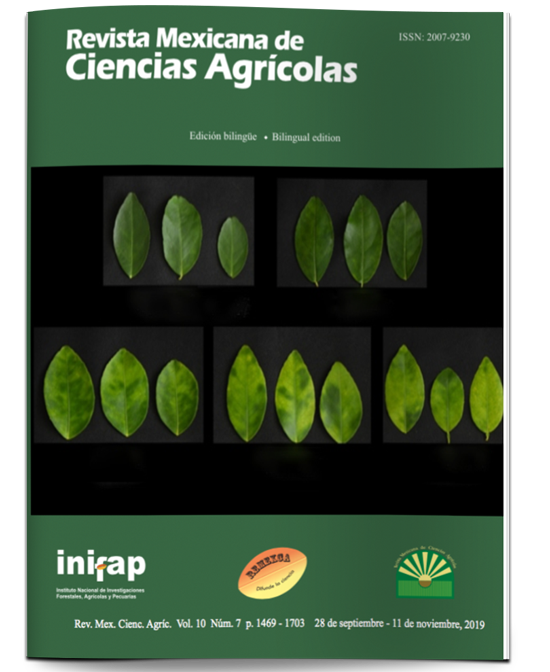Effect of Methylobacterium extorquens on tomato development in the presence or absence of Fusarium oxysporum
DOI:
https://doi.org/10.29312/remexca.v10i7.644Keywords:
Fusarium, Methylobacterium extorquens, Solanum lycopersicum, Oxysporum, biological controlAbstract
The wilting of tomato (Fusarium oxysporum) promotes the excessive use of synthetic fungicides, which are not economically or environmentally viable. This work proposes the use of Methylobacterium extorquens to determine its effect on plant development and the signaling pathway, for the defense of tomato plants, against phytopathogens. From tomato seeds var. SUN 7705 embedded and plants sprinkled with the bacteria at a concentration of 109 CFU mL-1, were challenged to the plant with the fungus in two tests. Variables of root length in seedlings, plant height, leaf amplitude, yield, total dry weight of the plant and dry root weight were measured. A completely randomized design with six treatments and four repetitions was used, two plants formed the experimental unit. Likewise, an essay was carried out on the expression of defense genes, in tomato seedlings of the same variety. Significant statistical differences (p≤ 0.05) were found between treatments embedded and sprinkled with M. extorquens and the treatments inoculated with F. oxysporum and the controls, reflecting in the seedling root length, plant height, leaf amplitude, dry weight of the plant and the root, as well as in the yield. However, the genes encoding the phenylalanine ammonium lyase (PAL), protein (PR-6), superoxide dismutase (SOD) and lipoxygenase (LOX) enzyme group, were not significantly expressed in seedlings treated with M. extorquens.
Downloads
Published
How to Cite
Issue
Section
License
The authors who publish in Revista Mexicana de Ciencias Agrícolas accept the following conditions:
In accordance with copyright laws, Revista Mexicana de Ciencias Agrícolas recognizes and respects the authors’ moral right and ownership of property rights which will be transferred to the journal for dissemination in open access. Invariably, all the authors have to sign a letter of transfer of property rights and of originality of the article to Instituto Nacional de Investigaciones Forestales, Agrícolas y Pecuarias (INIFAP) [National Institute of Forestry, Agricultural and Livestock Research]. The author(s) must pay a fee for the reception of articles before proceeding to editorial review.
All the texts published by Revista Mexicana de Ciencias Agrícolas —with no exception— are distributed under a Creative Commons License Attribution-NonCommercial 4.0 International (CC BY-NC 4.0), which allows third parties to use the publication as long as the work’s authorship and its first publication in this journal are mentioned.
The author(s) can enter into independent and additional contractual agreements for the nonexclusive distribution of the version of the article published in Revista Mexicana de Ciencias Agrícolas (for example include it into an institutional repository or publish it in a book) as long as it is clearly and explicitly indicated that the work was published for the first time in Revista Mexicana de Ciencias Agrícolas.
For all the above, the authors shall send the Letter-transfer of Property Rights for the first publication duly filled in and signed by the author(s). This form must be sent as a PDF file to: revista_atm@yahoo.com.mx; cienciasagricola@inifap.gob.mx; remexca2017@gmail.
This work is licensed under a Creative Commons Attribution-Noncommercial 4.0 International license.



